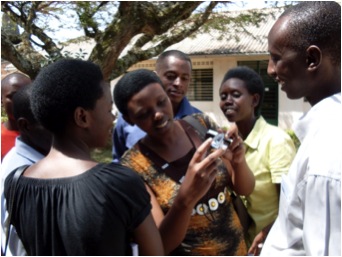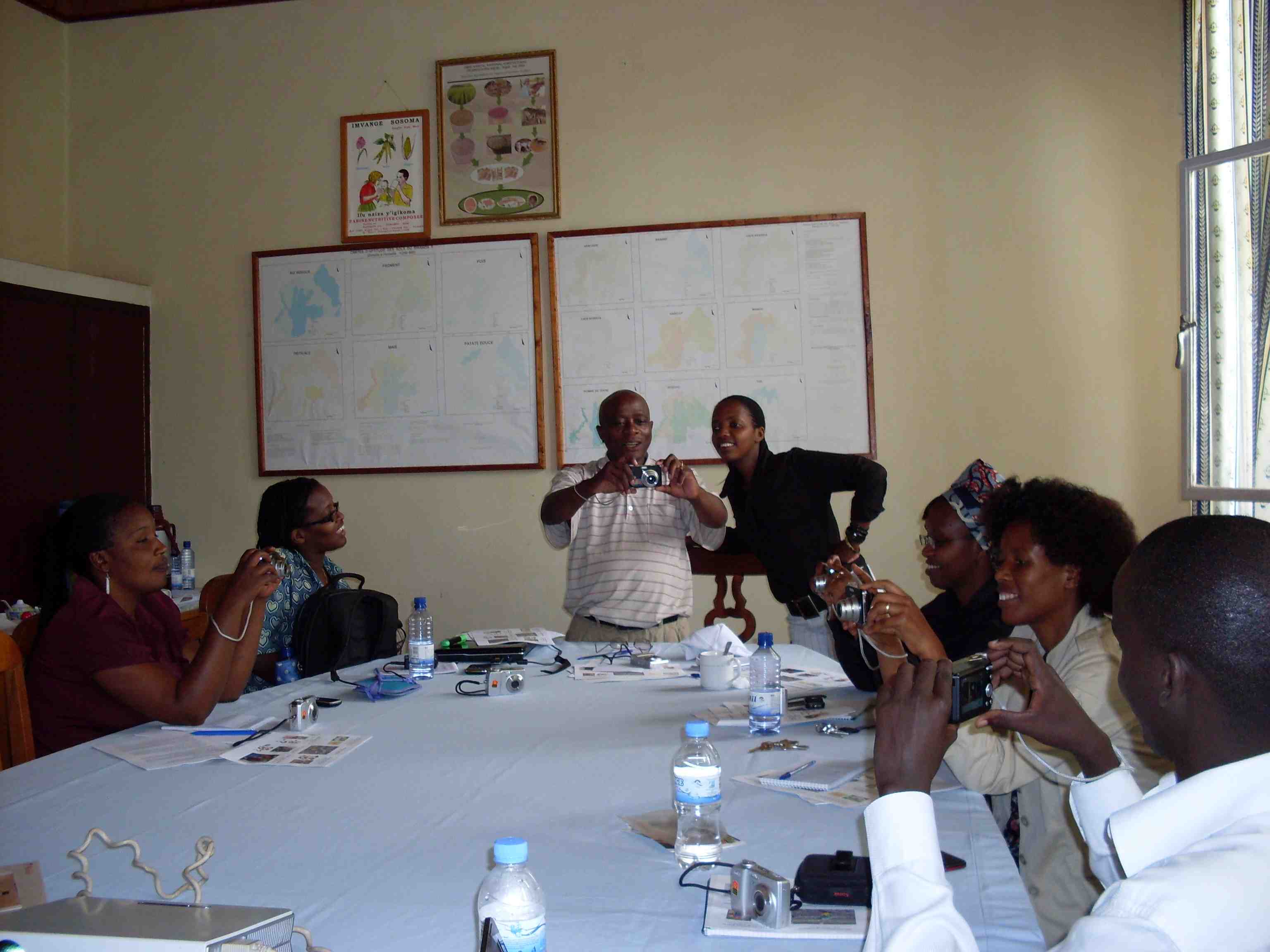Events
IGSF Workshop: "Feminist Visual Methodologies for Social Action"
McGill University – September 25, 2009
See the program
The McGill Institute for Gender, Sexuality, and Feminist Studies together with Myriam Gervais and Claudia Mitchell – members of its Equity and Justice research axis – hosted a one-day workshop on the study and use of visual methodologies in participatory feminist research.
Feminist visual methodologies are openly political approaches with multiple aims: to understand, give voice to, and validate women and girls – their needs, strategic interests, values, and their own prescriptions for their lives. This workshop will focus on photovoice and participatory video and the following features of these methodologies: (i) the interpretive process (ii) the technical and ethical challenges posed by the use of visual data (iii) the potential for social action and empowerment and (iv) methodological concerns related to the participatory process. Speakers and panelists at the workshop will reflect on the following: (1) honoring voice and difference through participatory research; (2) how research and action might interact; (3) forms of action and political implications.
Starting off with a participatory session with Brinton Lykes of Boston College, and including a panel of visual participatory work at McGill, the workshop closed with a public screening of David Eberts's new documentary Where the Water Meets the Sky. The documentary focuses on working with girls in Zambia to produce their own visual images as a way to speak out about their lives.
Activity Report
How feminism may change the methods?
Myriam Gervais, Université McGill et directrice de femSTEP
L’Institut Genre, sexualité et féminisme (IGSF) en collaboration avec Myriam Gervais et Claudia Mitchell, membres de son axe de recherche Équité et Justice, ont organisé le 25 septembre 2009 un séminaire d’une journée dans le but de se pencher sur les méthodologies visuelles participatives dans le cadre de la recherche féministe. Ce séminaire s’est tenu dans les locaux de l’Université McGill (Montréal, Québec, Canada).
Dans son allocation de bienvenue, Marguerite Deslauriers (Directrice de l’IGSF) a réitéré l’engagement de l’Institut à la recherche multidisciplinaire et appelé à se questionner sur la façon dont le féminisme peut ‘influer sur les méthodes’. À titre de co-organisatrice, Myriam Gervais a tenu à souligner la présence de collègues de l’Université de Montréal, de l’Université Laval, et des milieux du développement, et a inscrit les préoccupations de ce séminaire sur la contribution féministe aux méthodologies participatives dans le contexte du programme de recherche qu’elle dirige sur les questions de genre et de pauvreté rurale au Rwanda. Un des buts poursuivis par ce programme appelé femSTEP est de mettre en lumière la manière dont les méthodologies visuelles participatives peuvent générer des données et des éléments d’interprétation essentiels à la compréhension des inégalités de genre et informer, de ce fait, les politiques et stratégies de réduction de la pauvreté en Afrique. Claudia Mitchell, co-organisatrice, a par la suite introduite Brinton Lykes et souligné la contribution majeure de celle-ci à la recherche féministe engagée, et en particulier au développement de la photovoix comme instrument d’action sociale.
As Guest Speaker, Brinton Lykes (Boston University) invited the participants to compile a list of violations of the rights of girls and women, as a way of reflecting on rights. Lykes described her research projects in Chile, Guatemala and the post-Katrina U.S., where she has built partnerships to re-think disasters, and how she situates her projects within the histories of particular places. She argued that participants involved in the research should be allowed to be part of analysis and that we must recognize and value diverse ways of knowing. A panel discussion followed, with researchers who demonstrated the significance of feminist visual methodologies in their own work. The presentation of the three panelists offered a vibrant portrait of visual researcher’s challenges and highlights as well the importance of the contribution made by the intuitive work of the research participants. Based on a comprehensive treatment of visual data, their respective work made a compelling case for the validity and accountability of qualitative inquiry for feminist research approaches. Hourig Attarian (Concordia University), Ran Tao (McGill University), Sarah Flicker (York University) all offered panel presentations, and Susann Allnut (McGill University) acted as discussant.
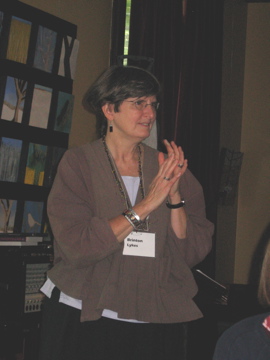
Brinton Lykes
Les travaux de Hourig Attarian sur la narration mémorielle et identitaire font ainsi appel à une méthodologie mariant l’art et l’autobiographie pour retracer les récits de cinq femmes appartenant à différentes générations mais qui possède en commun un héritage familial marqué par le génocide arménien. Hourig a utilisé la métaphore de l’album familial comme point de départ de son encadrement narratif pour ensuite mettre l’emphase sur les reconstructions faites par les participantes. Des photos, de vieux documents et d’anciens objets familiaux constituent « une archéologie de souvenirs et de signification » à l’intérieur de son questionnement narratif. Les collages thématiques qui en émergent font entrevoir les possibilités transformatrices des récits textuels et visuels.
Ran Tao examines youth and sexuality in the age of AIDS in China. Central to her work is a critical focus on the historical context of sex education in relation to gender inequality, as perceived and experienced by the youth participants in her study. Her analysis is built on a study of (and involving) youth at an urban university in China, using photovoice as a “research-intervention” approach to engage college students in discussion of social issues regarding sex, sexuality, HIV and AIDS. As such, it is a study of young people’s perspectives on sexual matters and gender roles in contemporary Chinese society.
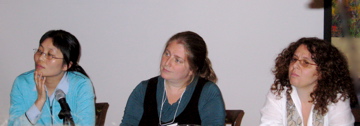
Ran Tao, Sarah Flicker, Hourig Attarian
Dans le cadre de sa présentation, Sarah Flicker a voulu mettre en lumière comment l’application de méthodes artistiques pouvait décoloniser le processus de la recherche pour introduire un agenda de recherche axé sur l’appropriation et le contrôle du sujet par les participants, en l’occurrence les jeunes autochtones. La photographie, la production de vidéo, la peinture et le théâtre sont toutes des méthodologies visuelles qui ont été utilisés pour étudier la façon dont les jeunes autochtones âgés de 13 à 18 ans comprennent la relation qui existe entre les risques individuels du VIH et les inégalités structurelles telles que le colonialisme, la pauvreté, et l’accès inéquitable aux soins de la santé.
In Ran Tao’s and Sarah Flicker’s studies, youth voices present significant differences from community and government perspectives regarding sexual matters, gender roles, HIV and AIDS. According to their analysis, the differences are institutionalized and will not disappear or change shortly. This finding reminds us of some of the challenges that faced researchers when they used participatory visual methodologies: what are the possibilities of bridging research and community and governmental practices while honoring voice and difference through participatory research? And are researchers actually making any difference through participatory research?
As discussant, Susann Allnut raises also some important questions related to the analytical process. For instance, she asked how the researchers dealt with participants' own photos given that they would have already made an initial analysis. When they looked at it again there is a second analysis and how to avoid inference in that? Sarah responded that the tension between the process and the product is definitely present. Susann mentioned how often this type of work has an immediacy that makes it hard to complete a deep analysis. While at the same time this work is often not easy to measure and needs much time.
Les méthodologies visuelles utilisées dans les approches participatives féministes en cherchant à comprendre et à permettre aux jeunes filles et aux femmes de s’exprimer sur leurs besoins et intérêts stratégiques, leurs valeurs et leurs solutions s’inscrivent d’emblée dans une démarche politique.
As an illustration of the potential for visual participatory methodologies to lead to social action, a documentary film was the closing event of this one-day workshop. Where the Water Meets the Sky, supported by international non-profit organization, the Campaign for Female Education (CAMFED), documents a participatory filmmaking project that provides women in a remote region of northern Zambia with the tools to share their own stories and perspectives. Most of the group lacked conventional literacy; yet they were able to use the video camera to challenge age-old social injustices within their community and encourage serious change. This group of 23 women produces a film that portrays a subject of their own choosing. It involves an issue that has affected them all, but one that few will discuss: the plight of young women, orphaned by AIDS. Their film, I’ve Found My Way, has been shown to over 3,000 people across the region.
Le séminaire a aussi permis de montrer un exemple de photovoix avec l’exposition de Jennifer Thompson (Université McGill) dont le projet avait pour but d’exposer et de révéler la vision de jeunes et de leurs aînés au sein d’une même communauté au Sierra Leone sur la conservation écologique de leur milieu de vie. En plus du support de l’Institut, la tenue de ce séminaire a bénéficié de l’aimable collaboration d’Éliane Ubalijoro (présidente de séance) et de David Eberts (réalisateur du documentaire) ainsi que de l’implication de plusieurs étudiants de McGill, soient Lysanne Rivard, Katie MacEntee, Margaret Dobson, Lydia Meldrum, Kathleen Ulsher, et John Murray.
Pour plus d'information, veuillez contacter myriam.gervais@mcgill.ca ou claudia.mitchell@mcgill.ca
For more information, please contact myriam.gervais@mcgill.ca or claudia.mitchell@mcgill.ca
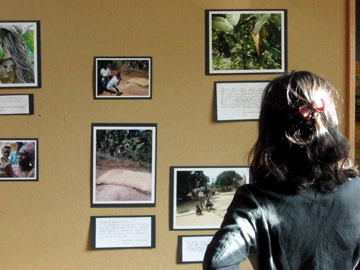
Exhibition by Jennifer Thompson, Exposition par Jennifer Thompson
Photovoice training session with students at the National University of Rwanda
Butare, May 2011
Photovoice training session with agronomists at the Rwanda Agricultural Board
Butare, May 2011


